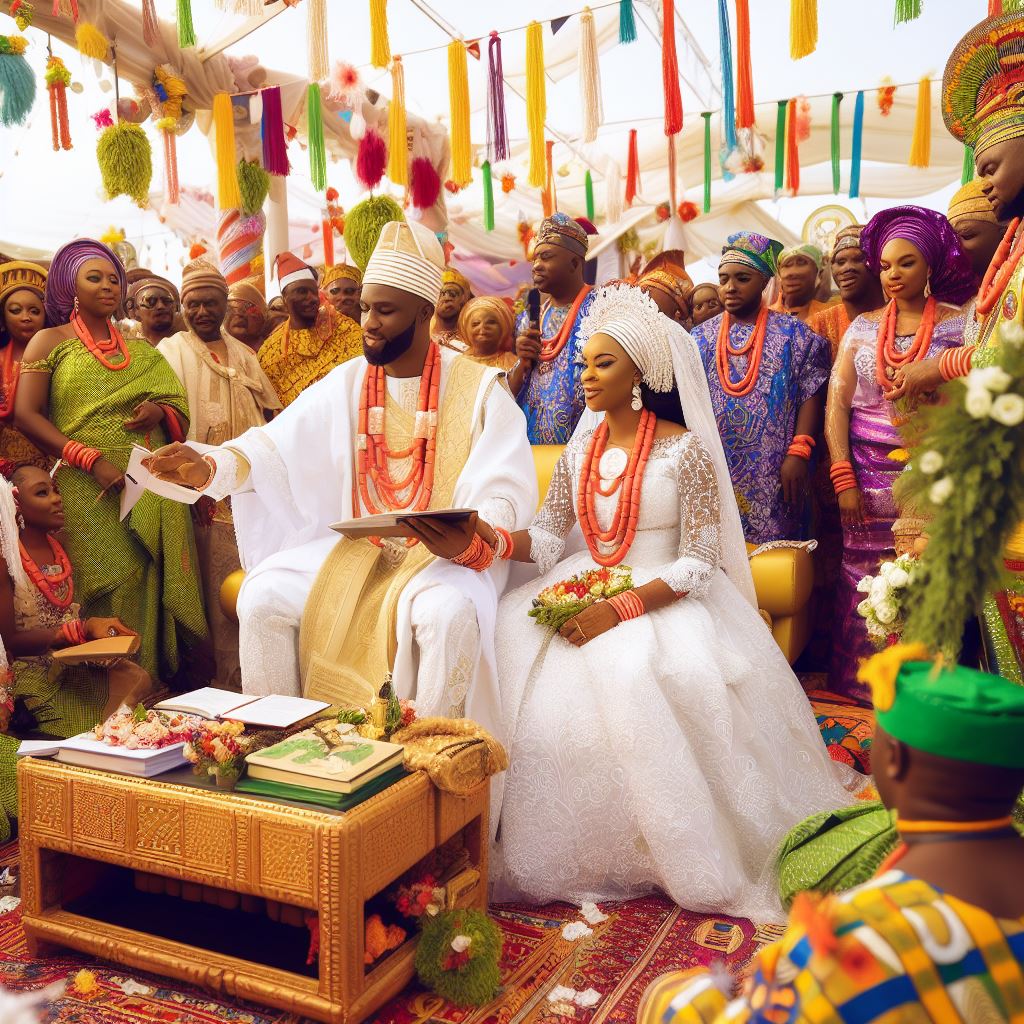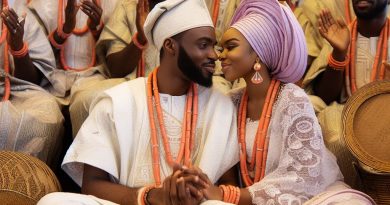Protecting Assets & Legacies: Ordinance Marriage in Nigeria
Last Updated on October 18, 2023
Introduction
In Nigeria, Ordinance Marriage is not only a sacred union between two individuals but also a legally recognized institution that carries immense cultural significance.
It is a pillar of society and plays a crucial role in shaping the structure and dynamics of families and communities.
Protecting assets and legacies is of utmost importance when it comes to marriage.
Whether it is the wealth accumulated over generations or personal assets earned through hard work, safeguarding these assets ensures financial stability and a prosperous future for individuals and their families.
In the context of Nigerian society, where extended families and communal living arrangements are common, the protection of assets and legacies becomes even more critical.
Marriage often involves the merging of resources and properties, and the equitable distribution of these assets is essential for harmony and stability within the family unit.
Furthermore, protecting assets and legacies helps to preserve the cultural heritage and identity of families.
Many families in Nigeria have a rich history and legacy that they wish to pass on to future generations.
By ensuring the preservation of assets, including land, houses, businesses, and heirlooms, families can maintain their historical and cultural heritage, keeping their traditions alive for years to come.
Basically, marriage in Nigeria is a significant institution that carries both cultural and legal importance.
Protecting assets and legacies is crucial to ensure the financial security of individuals and their families while preserving their cultural heritage.
By doing so, they can pave the way for a stable and prosperous future for generations to come.
Understanding Ordinance Marriage
Definition and characteristics of an ordinance marriage in Nigeria
An ordinance marriage in Nigeria is a legal and formalized union between a man and a woman.
It is governed by the Matrimonial Causes Act and recognized by the Nigerian legal system.
To be considered an ordinance marriage, the couple must adhere to certain criteria and requirements.
- The couple must be of sound mind and at least 21 years old.
- Both parties must freely consent to the marriage without any coercion or duress.
- The marriage must be solemnized in the presence of a marriage registrar and two witnesses.
- The ceremony must take place in a licensed place of worship or a registry office.
- The marriage must be registered with the appropriate authorities within 14 days of the ceremony.
Legal requirements and process of entering into an ordinance marriage
Before entering into an ordinance marriage in Nigeria, there are crucial legal requirements and steps to follow.
- Notice of Marriage: The couple must give a notice of their intention to marry at the registry office.
- Waiting Period: After giving the notice, there is a mandatory 21-day waiting period before the marriage can take place.
- Marriage Certificate: The couple must obtain a marriage certificate from the registry office.
- Marriage Ceremony: The marriage ceremony can be conducted in a licensed place of worship or a registry office.
- Registration: The couple must register the marriage with the appropriate authorities within 14 days.
Advantages of Ordinance Marriage in Nigeria
Ordinance marriage offers several advantages to couples in Nigeria, including legal protection and recognition.
- Legal Protection: An ordinance marriage provides legal protection for both spouses and their rights.
- Inheritance Rights: It ensures that both parties have a legal claim to each other’s assets and properties.
- Divorce Proceedings: In the event of a divorce, an ordinance marriage follows a legal process, protecting the rights of both parties.
- Social Recognition: Ordinance marriage is widely accepted and recognized by society, providing social status to the married couple.
- Child Custody and Support: In the case of separation, an ordinance marriage provides legal provisions for child custody and support.
Challenges of Ordinance Marriage in Nigeria
Despite its advantages, ordinance marriage in Nigeria also faces some challenges that couples need to be aware of.
- Cost: The process of entering into an ordinance marriage can be expensive, with fees for marriage notices, certificates, and registration.
- Religious Differences: Some religious groups may not recognize ordinance marriages and may require separate religious ceremonies.
- Cultural Barriers: In some communities, ordinance marriages might not be accepted due to cultural or traditional beliefs.
- Stigma: There may be a stigma attached to couples who choose to have an ordinance marriage instead of traditional ceremonies.
Understanding ordinance marriage in Nigeria is crucial for couples who wish to protect their assets and legacies.
By adhering to the legal requirements and following the proper process, couples can enter into a legally recognized union.
Despite the challenges, many couples opt for ordinance marriages to ensure legal protection and social recognition.
It is important for couples to weigh the advantages and disadvantages and make an informed decision about their marital union.
Read: Steps to Register a ‘Marriage by Ordinance’ in Nigeria: A Guide
Advantages of Ordinance Marriage
Protection of individual assets
- Ordinance marriage offers protection of individual assets owned by each spouse.
- Assets acquired before marriage remain the separate property of each spouse.
- This safeguards personal wealth and prevents it from being divided in case of divorce.
- It allows individuals to maintain control over their financial resources and investments.
- This advantage is crucial for individuals with significant assets or businesses.
Preservation of family legacies
- With ordinance marriage, family legacies can be preserved through the generations.
- Property and assets can be passed down to children without the fear of it being divided.
- This ensures that the family’s wealth is not diluted and can continue to grow over time.
- Family businesses can also be safeguarded, ensuring their continuity for future generations.
- Ordinance marriage helps in maintaining and strengthening the family’s financial stability.
Rights and privileges granted by law
- By opting for an ordinance marriage, couples are entitled to various legal rights and privileges.
- These rights include inheritance, tax benefits, spousal support, and social security benefits.
- Ordinance marriages grant legal recognition and protection to the spouses and their relationship.
- This ensures that both partners are treated as equals under the law, regardless of gender.
- The legal framework provided by an ordinance marriage enhances the overall security and well-being of the couple.
Ease of property division in case of divorce or separation
- In the event of divorce or separation, an ordinance marriage simplifies property division.
- The law provides guidelines for the equitable distribution of assets acquired during the marriage.
- This eliminates conflicts and lengthy legal battles over property rights and ownership.
- Both spouses can have a clear understanding of their entitlements, facilitating a smoother process.
- Ordinance marriage ensures that property division is fair, transparent, and less financially burdensome for both parties involved.
Generally, choosing an ordinance marriage in Nigeria offers several advantages.
It protects individual assets and allows for the preservation of family legacies.
It grants couples various legal rights and privileges, ensuring equality and security.
Additionally, it simplifies property division in the unfortunate event of divorce or separation.
These benefits make ordinance marriage an attractive option for couples seeking to safeguard their assets and secure their legacies.
Read: The Legal Requirements of a ‘Marriage by Ordinance’ in Nigeria
Considerations before Entering into an Ordinance Marriage
Pre-marital agreement and financial discussions
- Have an open and honest conversation about finances before getting married.
- Create a pre-marital agreement to outline how assets and debts will be divided.
- Discuss expectations regarding financial responsibilities, such as bill payments and savings.
- Consider seeking professional advice to ensure a fair agreement for both parties.
- Address any concerns or discrepancies regarding individual financial situations.
- Be transparent about existing debts, loans, and other financial obligations.
- Decide how joint finances will be managed and establish a budget accordingly.
- Discuss financial goals and aspirations as a couple to ensure alignment.
- Consider the importance of regularly reviewing and updating the pre-marital agreement.
- Remember that a pre-marital agreement can be helpful in protecting assets and clarifying financial expectations.
Awareness of potential challenges and limitations
- Understand that entering into an ordinance marriage can have legal implications.
- Consider the potential challenges that may arise due to differences in financial habits.
- Be aware of the limitations of the existing legal system in Nigeria regarding asset protection.
- Recognize that marriages can face unexpected financial difficulties; be prepared to address them together.
- Realize that it may take time and effort to reach a financial balance as a couple.
- Stay informed about the legal rights and responsibilities associated with an ordinance marriage.
- Research and understand the potential consequences of divorce on financial matters.
- Be aware that joint ownership of assets can create complications during legal disputes.
- Consider the impact of potential creditors on shared assets and liabilities.
- Remember that staying informed and aware can help navigate potential challenges effectively.
Legal advice and consultation
- Consult with a lawyer experienced in family law to understand the legal implications fully.
- Seek professional advice to ensure compliance with the requirements of an ordinance marriage.
- Consider obtaining legal guidance to draft a comprehensive and fair pre-marital agreement.
- Get advice on how to protect personal assets acquired before marriage.
- Understand the legal process of dividing assets and debts in the event of divorce or separation.
- Ask questions about any concerns or uncertainties regarding the legal aspects of an ordinance marriage.
- Ensure complete comprehension of the legal rights and responsibilities associated with marriage.
- Work with a lawyer to update or modify the pre-marital agreement as circumstances change.
- Remember that proper legal advice can contribute to a smoother and more secure marriage.
- Consultation with an attorney can provide peace of mind and confidence in the decision-making process.
Entering into an ordinance marriage requires thoughtful consideration and planning to protect assets and legacies.
By engaging in pre-marital financial discussions, being aware of potential challenges, and seeking legal advice, couples can establish a strong foundation for their future together.
Essentially, understanding the importance of these considerations can lead to a more harmonious and secure marriage.
Read: Expert Tips for a Smooth ‘Marriage by Ordinance’ Registration Process

Strategies to Protect Assets and Legacies
Create a Comprehensive Estate Plan
- Engage a qualified attorney to draft a will or trust.
- Clearly define how assets should be distributed.
- Consider tax implications when planning.
Ensure Proper Documentation of Assets and Properties
- Maintain an organized record of all properties.
- Include details like ownership, purchase dates, and values.
- Store important documents in a secure location.
Utilize Trusts or Wills to Distribute Assets
- Set up trusts to protect assets from legal challenges.
- Clearly state beneficiaries and their entitlements in your will.
- Consult with experts to determine the best approach.
Regularly Review and Update Beneficiary Designations
- Periodically check and update beneficiary designations.
- Ensure they align with your current wishes.
- This can prevent unwanted disputes later.
Communication with Future Generations about Family Legacies
- Initiate open and honest discussions.
- Share your values and intentions.
- Educate the next generation about wealth management.
Protecting assets and legacies in Nigeria requires proactive measures.
Creating a well-structured estate plan, proper documentation, and communication can ensure a smooth transition of wealth and values.
Reviewing and updating plans regularly safeguards against unforeseen challenges.
Utilizing trusts and wills, tailored to your specific needs, adds an extra layer of protection.
In the end, the key to preserving your legacy lies in strategic planning and open dialogue with your heirs.
Read: Dealing with Family Pressures: Ordinance vs. Traditional Weddings
Challenges and Risks
Cultural and Societal Expectations
- Diverse Traditions: Nigerian society boasts a rich tapestry of cultures, each with its unique customs and norms.
- Conflict of Traditions: Ordinance marriages can sometimes clash with deeply ingrained cultural expectations.
- Family Pressures: Families often expect traditional marriages, which can strain relationships in an ordinance marriage.
- Community Perceptions: Ordinance marriages can be stigmatized, causing friction with the broader community.
- Education and Awareness: Addressing these challenges begins with education and promoting understanding of ordinance marriage’s legitimacy.
Potential Disputes and Legal Battles
- Property Rights: Disputes over assets can escalate into protracted legal battles, causing emotional and financial strain.
- Inheritance Conflicts: Clarity in wills and succession planning is crucial to avoid inheritance disputes.
- Custody Battles: Child custody matters can lead to prolonged legal fights, impacting the well-being of children.
- Documentation Errors: Accurate record-keeping is vital to prevent legal disputes over marital status and assets.
- Mediation and Pre-nuptial Agreements: These can help prevent disputes and expedite conflict resolution.
Importance of Continuous Communication and Understanding Between Partners
- Open Dialogue: Regular, honest communication is the cornerstone of a successful ordinance marriage.
- Mutual Respect: Respect for each other’s backgrounds and expectations fosters harmony.
- Adaptability: Flexibility in embracing both partners’ traditions can mitigate cultural clashes.
- Seeking Legal Advice: Consulting lawyers can help navigate potential pitfalls and protect each other’s interests.
- Counseling and Support: Couples can benefit from professional counseling and support groups to tackle challenges together.
In navigating the complexities of ordinance marriages in Nigeria, couples must embrace cultural diversity, prepare for potential legal disputes, and, above all, nurture a foundation of communication and understanding for a lasting and harmonious union.
Conclusion
Protecting assets and legacies is of utmost importance to ensure the financial security and well-being of individuals and their families.
By opting for an ordinance marriage, couples can safeguard their assets, secure their legacies, and enjoy legal protections that come with this type of union.
Final thoughts and call to action
It is crucial for individuals in Nigeria to be proactive in safeguarding their assets and legacies by exploring the benefits of an ordinance marriage.
By taking this step, they can ensure that their hard-earned wealth and legacy are protected for future generations.
Consider speaking to a legal professional or marriage counselor to understand the process and requirements of an ordinance marriage, and take action to secure your financial future.


